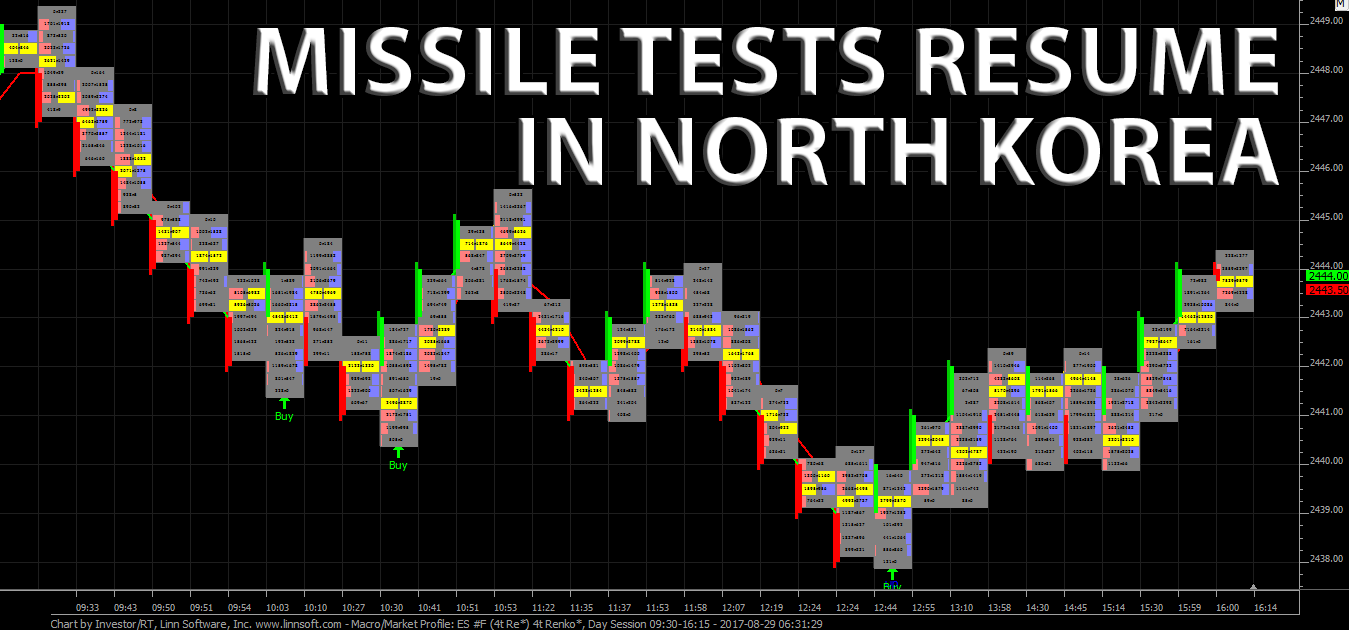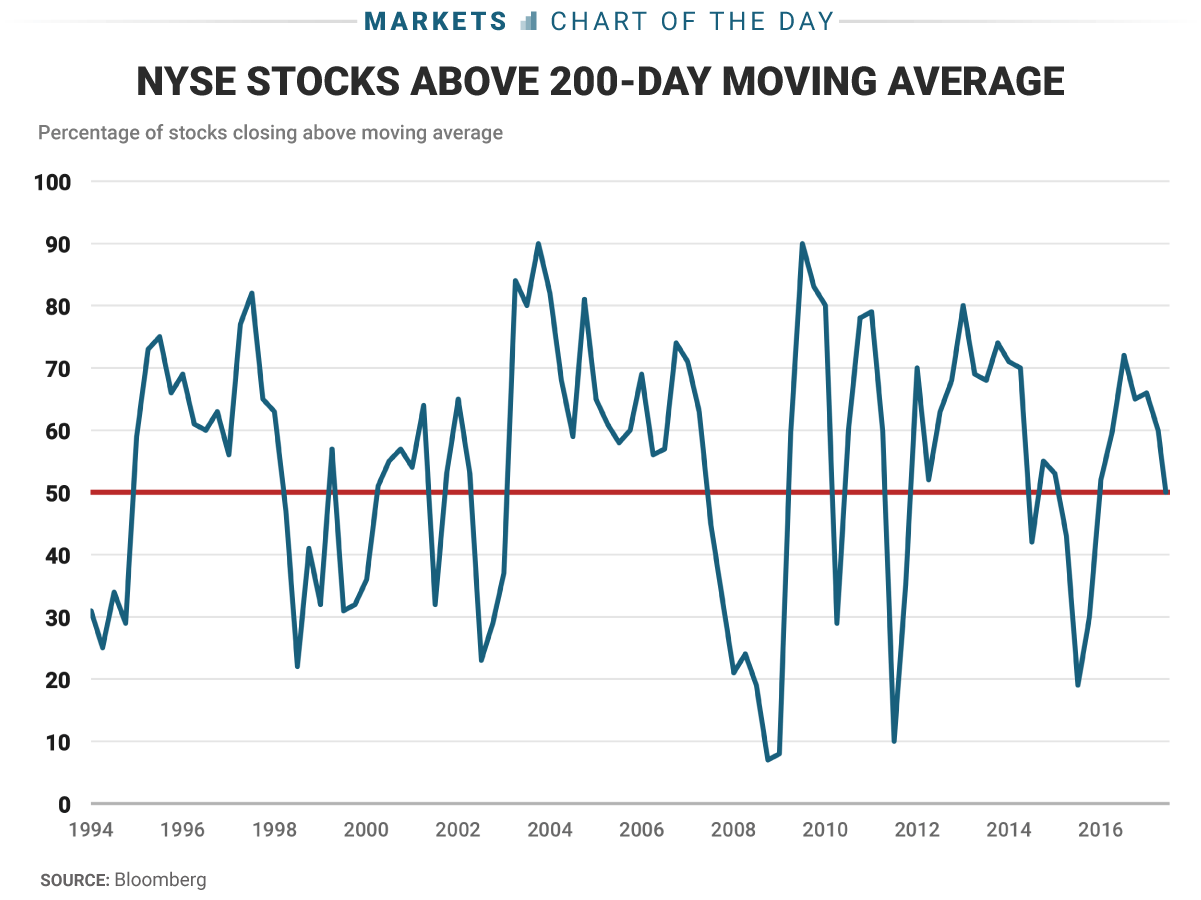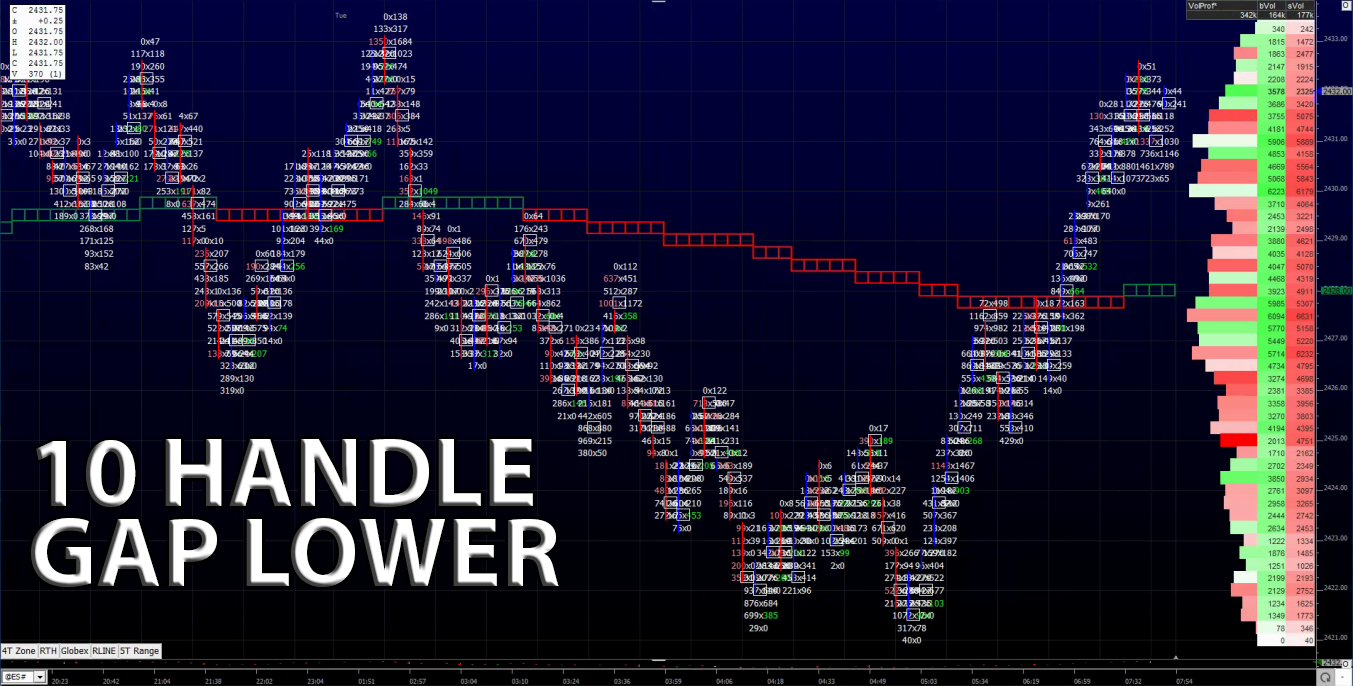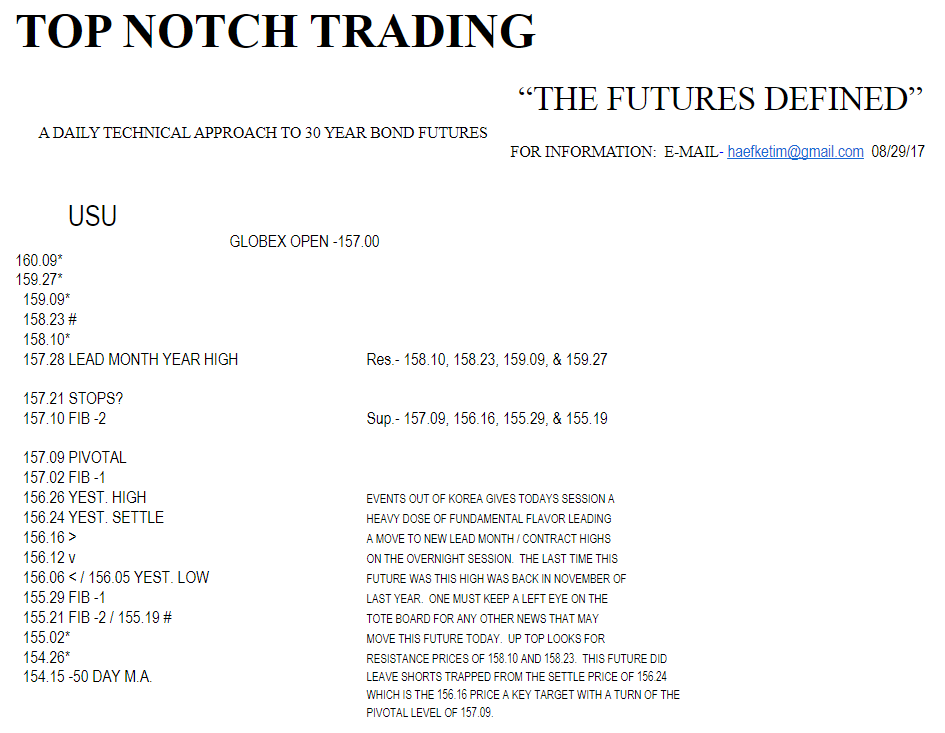
Mondays Trade
The S&P 500 futures (ESU17:CME) traded 2449.00 on the 8:30 CT futures open. After the open, and like many gap ups, the ES sold off down to 2441.25 in the first half hour of trade, and then started to bounce.
After the early low the ES bounced back above the vwap up to 2444.50 and then made a new low at 2440.50 (lower low), then traded back above the vwap to 2445.50 before going back down to 2441.00. After another attempt at the vwap, the ES finally gave way to the downside, trading down to 2438.00, and then slowly rallied up to the 2442.00 area around 1:25 CT. After that, the ES finally popped up to 2443.25 when the MiM Flipped from $500 million to sell to $200 million to buy.
There are three very distinct patterns that have been showing up in the ES. The first is sell the gap up opens, the second is the late day / going into the close weakness, and the third is buying the weakness on Globex after the 3:15 futures close, but that one didn’t work so well last night.
If you didn’t sell the gap up open, or buy the dip down to 2440.50, it was a long wait and a lot of chop getting to the 2438.00 low and late rally. The overall trade and volume was low. Total volume was under 1 million. In the end, the S&P 500 futures (ESU17:CME) settled at 2443.75, up +1.25 handles, or +0.05%, the Dow Jones futures (YMU17:CBT) settled at 21791, down -18 points, or -0.08%, and the Nasdaq 100 futures (NQU17:CME) settled at 5844.75, up +19.75 points, or +0.33%.
After The Close
Its was a quiet day and another busy night for the S&P 500 futures (ESU17:CME) after North Korea shot off another missile over Japan last night. It was just a few days ago that Secretary of State Rex Tillerson said, “I’m pleased to see that the regime in Pyongyang has certainly demonstrated some level of restraint,” suggesting that the brief pause in testing may be enough to meet the administration’s preconditions for talks. In the last two days North Korea has fired off four missiles. After Monday’s day session close, the ES traded up to 2444.75, but when the news hit the wire the ES gapped down 10 handles to 2434.00, and then sold off down to 2421.00.
Lot Of Moving Parts
There really are a lot of moving parts right now, and I think the Bloomberg story below touches most of the points. While the markets are holding together, the resignation Tracey Ann Jacobson, a career foreign service officer responsible for overseeing U.S. policy at international organizations, including the UN, and the State Department’s top UN envoy, and then President Trump slated to speak in front of world leaders at the UN General Assembly in September, continues to show how frayed the administration is.
Wall Street Vets From Dalio to Gundlach Warn on Emerging Markets
- Emerging-market valuations ‘fairly full,’ Janus Capital says
- North Korea, Venezuela and U.S. debt ceiling all seen as risks
More investors are joining the cast of Wall Street veterans from Jeff Gundlach to Ray Dalio in warning that risky assets are overvalued.
They point to rising global turmoil underscored by the recent terrorist attacks in Barcelona and the racially charged violence in Charlottesville, Virginia, as well as valuations that no longer compensate for potential flare ups in North Korea and Venezuela. That’s not to mention the unpredictability in the U.S., where President Donald Trump is feuding with members of Congress before a critical vote to increase the country’s debt ceiling.
Among the assets under scrutiny are emerging-market bonds, which for only the third time in history are yielding less than U.S. junk debt. Some of the world’s largest money managers, from Pacific Investment Management Co. to T. Rowe Price Group Inc., are advising investors to reduce risk by trimming holdings of developing-nation assets.
In addition Fundstrat’s Global Advisors Thomas Lee is saying “If historical precedent applies, the S&P 500 is set for about a ~4%-5% decline in the next month towards 2,300 or so,” wrote in a note to his clients.” Bloomberg has an index that tracks this, called Tradpaus. Lee said “When Tradpaus moves below 50, it is saying fewer stocks are supporting the overall index and our analysis shows, such deterioration historically results in the S&P 500 ultimately falling below its 200-day — this happened 23 of 24 times.

But that’s not the end of it according to Bank of America Merrill Lynch (NYSE:BAC) data Mutual funds and exchange-traded funds that invest in U.S. equities marked their 10th consecutive week of net outflows during the seven days ended Wednesday, the longest such streak in 13 years. $2.6 billion pulled from U.S. equity funds in the latest week helped push withdrawals to $30 billion since late June.
While You Were Sleeping

Overnight, equity markets in Asia and Europe all took a hit, as North Korean missile tests have everyone rattled.
In the U.S., the S&P 500 futures opened last night’s globex session at 2434.00, leaving a 10 handle gap to be filled. Not including the gap, the ES traded in an 13 handle range from 2421.00 – 2434.00, and is currently trading on the higher end of the that range. As of 6:50am CT, the last print in the ES is 2430.50, down -13.25 handles, with 338k contracts traded.
In Asia, 9 out of 11 markets closed lower (Shanghai +0.09%), and in Europe 12 out of 12 markets are trading lower this morning (FTSE -1.06%).
Today’s economic calendar includes S&P Corelogic Case-Shiller HPI (9:00 AM ET), and Consumer Confidence (10:00 AM ET).
War On The Peninsula
Our View: There has been another round of calls for pullbacks and selloffs, and while I just do not think it’s in the cards, the red lines established with North Korea are a game changer. Investors have been nervous, and the $30 billion pulled from mutual funds since June shows it. Thats a lot of cash being pulled, but the ES is still up 8.5% on the year, and with the fed on hold, I think historically low rates are still a major part of why the markets are holding up so well, but war on the Korean Peninsula would be a catastrophic game changer..
Our view is that we need to see what the U.S. response to North Korea’s provocative actions are going to be. President Trump is very unpredictable, and the U.S. has a lot of military assets in Asia. One has to wonder if war is coming on the peninsula.

- In Asia 9 out of 11 markets closed lower: Shanghai Comp +0.09%, Hang Seng -0.35%, Nikkei -0.45%
- In Europe 12 out of 12 markets are trading lower: CAC -1.28%, DAX -1.69%, FTSE -1.06%
- Fair Value: S&P -0.60, NASDAQ +2.69, Dow -15.80
- Total Volume: 930k ESU, and 418 SPU traded in the pit
Which stock should you buy in your very next trade?
AI computing powers are changing the stock market. Investing.com's ProPicks AI includes 6 winning stock portfolios chosen by our advanced AI. In 2024 alone, ProPicks AI identified 2 stocks that surged over 150%, 4 additional stocks that leaped over 30%, and 3 more that climbed over 25%. Which stock will be the next to soar?
Unlock ProPicks AI